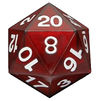Difference between revisions of "How to Design an Encounter"
| Line 3: | Line 3: | ||
==How to Calculate the Challenge Rating for an Encounter== |
==How to Calculate the Challenge Rating for an Encounter== |
||
| − | 1. '''Calculate the Average Party Level, or APL.''' That is, total the levels of each player character in the plot, then divide the end result by the number of players, and round it to the nearest number (not necessarily down). |
+ | 1. '''Calculate the Average Party Level, or APL.''' That is, total the levels of each player character in the plot, then divide the end result by the number of players, and round it to the nearest number (not necessarily down). From here: |
: Decrease the APL by 1: |
: Decrease the APL by 1: |
||
:: If the number of players is 3 or fewer |
:: If the number of players is 3 or fewer |
||
| Line 12: | Line 12: | ||
:: If circumstances play heavily in their favor |
:: If circumstances play heavily in their favor |
||
| − | For example, a group of 4 consisting of: 4, 3, 4, and 4 levels would equal an APL of around 6 on Tenebrae (average is around 4th, then +2). If there was a 5th character, the APL would be at least 7. |
||
| ⚫ | |||
| − | |||
| ⚫ | |||
<center> |
<center> |
||
{{TableMain}} |
{{TableMain}} |
||
| Line 34: | Line 32: | ||
|- |
|- |
||
| Epic ||APL +3 |
| Epic ||APL +3 |
||
| + | |} |
||
| − | |||
|{{TableMain}} |
|{{TableMain}} |
||
| + | {{T01}} |
||
| + | |colspan="2"|Tenebrae Pathfinder |
||
{{T02}} |
{{T02}} |
||
| Difficulty |
| Difficulty |
||
| Challenge Rating Equals |
| Challenge Rating Equals |
||
|- |
|- |
||
| − | | Easy ||APL |
+ | | Easy ||APL +1 |
|- |
|- |
||
| − | | Average ||APL+ |
+ | | Average ||APL+2 |
|- |
|- |
||
| − | | Challenging ||APL + |
+ | | Challenging ||APL +3 |
|- |
|- |
||
| − | | Hard ||APL + |
+ | | Hard ||APL +4 |
|- |
|- |
||
| − | | Epic ||APL + |
+ | | Epic ||APL +5 |
|}|} |
|}|} |
||
|}</center> |
|}</center> |
||
Revision as of 02:46, 26 June 2016
Here is how to design Pathfinder encounters! Just keep in mind that CR is a good estimate, but may change according to party makeup.
How to Calculate the Challenge Rating for an Encounter
1. Calculate the Average Party Level, or APL. That is, total the levels of each player character in the plot, then divide the end result by the number of players, and round it to the nearest number (not necessarily down). From here:
- Decrease the APL by 1:
- If the number of players is 3 or fewer
- If circumstances are heavily slated against the player characters
- Increase the APL by 1:
- If there are 5 or more players
- If circumstances play heavily in their favor
2. Determine the challenge you want to present. Tenebrae characters are stronger than average because of their higher point buy, as well as the number of options provided ingame. The following chart has been adjusted to reflect that, although we've provided the standard one for reference.
|
| ||||||||||||||||||||||||||||
3. Compare this modified APL with the charts, below, to determine your XP Budget. For example, if your modified APL was 6, then you have an "XP Budget" of 2,400. Multiple creatures equal a higher CR.
|
|
4. Go monster hunting. To find out how many and which monsters you can use, total the individual XP values of each monster. Then, compare the end result with your "XP Budget" number. Once you're close to your number, you've "filled" the monsters for that encounter.
Don't worry if the value isn't exactly equal--just approximate it the best you can.
Advanced Advice on Crafting Challenging Encounters
| Template:PrPWorkshopList |
Cheat Sheets and Etc.
| Tools for GMs | ||
| Question | Answer | |
| How can I design an encounter? | We wrote an article on it! See How to Design an Encounter for your answers. | |
| Are there tools to make running encounters easier? | A lot of plot runners on Tenebrae use a software called Combat Manager to help track enemy HP totals and have enemy stat blocks available at a glance.
The Player-Contributed Encounter Grab Bag has some player-contributed inspiration for running your own encounters, too. | |
| Where can I find monsters for encounters? | Check out the Tenebrae Bestiary. The only approved sources for monsters are listed on this page!
Keep in mind that there are creature restrictions depending on what type of PRP you're running! (See Standard PRPs and Death Consent PRPs for more on those.) Dragons and demiliches are reserved for staff-only events to keep them unique. Catfolk, driders, and drow are not in theme and therefore are not permitted. | |
| What if I want to offer legwork? What IS legwork? | The Legwork Mini-Guide for GMs explains it all!
+help legwork in-game is helpful too. | |
MUX versus Tabletop
Encounters in a MUX tend to take longer due to the nature of the medium. This is one of the reasons we have the 2 encounter limit in PrPs.
